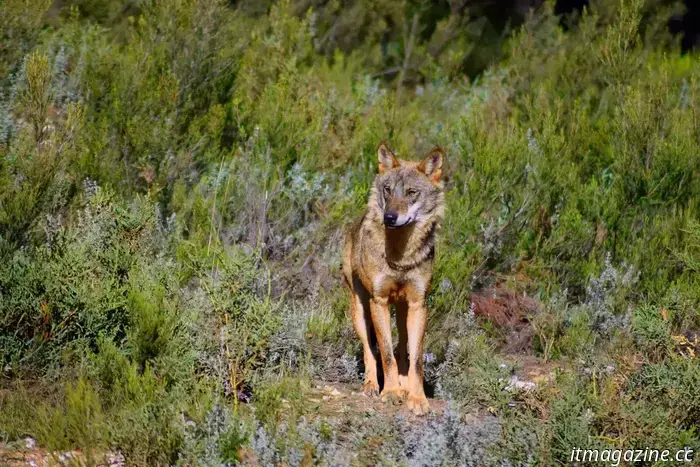
The return of the dire wolf? It's more akin to a massive instance of conservation-washing.
The US biotech startup Colossal Biosciences claims to have resurrected the dire wolf — or at least that’s the impression they aim to create. Social media is filled with viral videos, memes, and pictures of fluffy white puppies, with frequent references to Game of Thrones. The story has even made it onto the latest cover of Time magazine.
However, beneath the excitement lies a concerning delusion about de-extinction that could divert attention from effective solutions to the biodiversity crisis. The Trump administration is already using Colossal's assertions as a justification to reduce protections for endangered species.
Let’s clarify: Colossal did not actually bring back the dire wolf. They extracted DNA from ancient dire wolf remains and edited a selection of those genes into the genomes of modern grey wolves, resulting in larger bodies, broader skulls, and specific coat colors. This is an impressive technical achievement, but these fluffy white cubs are merely mutations at best.
Colossal asserts that it has “successfully restored a once-eradicated species through the science of de-extinction” for the “first time in human history.” This claim is factually incorrect, as many scientists have already noted. As University of Maine paleoecologist Jacquelyn Gill stated on Bluesky, “The casual disregard for the truth and life itself in this work is genuinely abhorrent to me.”
Nonetheless, Colossal shows no signs of slowing down. Last month, the $10 billion company employed a similar method to create a woolly mouse — a genetically engineered rodent with mammoth-like fur. Moving forward, Colossal intends to “resurrect” other extinct species, such as the dodo, Tasmanian tiger, and giant mammoth.
The company argues that these projects demonstrate the potential of de-extinction technologies to help bring back lost species and restore ecological balance. They are leading a growing movement for de-extinction in the US, alongside organizations like Revive & Restore and Re:Wild.
In contrast, Europe has concentrated its rewilding efforts on reintroducing existing species, such as bison, wolves, and beavers, to areas where they were previously hunted to extinction.
While the genetically engineered “dire wolves” gain viral attention, the Iberian wolf, which still exists, is endangered. Credit: Animal Record/Creative Commons
Meanwhile, a new wave of biodiversity-focused startups is utilizing technology to restore nature in more rational ways. For example, Switzerland's Stream Ocean has created facial recognition technology for fish that helps scientists monitor population numbers. Germany’s Soilytix tracks soil health with environmental DNA, while UK startup Pivotal Earth links corporate funding to recognized conservation initiatives.
This is where technology can be effectively applied to restore biodiversity, rather than through sensational conservation methods that not only overhype but also pose a significant distraction from tried-and-true approaches.
Colossal has sent the message that extinction can be reversed — but that isn’t true.
While the public is enamored with the adorable mutated "dire wolves" on Instagram, biodiversity loss continues to escalate. One million known species are at risk of extinction, with extinction rates currently occurring up to 1,000 times higher than they were before humanity's impact.
We must allocate resources to safeguard the species we still have, such as the Iberian wolf. Once widespread, this canid is now limited to mountainous regions in Portugal and Spain, with only about 2,200 individuals left.
Humanity must prioritize protecting existing biodiversity and restoring damaged ecosystems. Instead of attempting to play God with long-extinct species, we should advocate for the endangered species that are still in existence.

Other articles
 A solution to AI's energy dependency? Increased AI, according to the IEA.
The rapid increase in energy consumption by AI could potentially be addressed by… additional AI. This insight comes from a recent report by the International Energy Agency (IEA).
A solution to AI's energy dependency? Increased AI, according to the IEA.
The rapid increase in energy consumption by AI could potentially be addressed by… additional AI. This insight comes from a recent report by the International Energy Agency (IEA).
 NYT Strands for today: clues, spangram, and solutions for Thursday, April 10.
Strands offers a challenging twist on the traditional word search from NYT Games. If you're having difficulty and can't figure out today's puzzle, we've got assistance and clues for you right here.
NYT Strands for today: clues, spangram, and solutions for Thursday, April 10.
Strands offers a challenging twist on the traditional word search from NYT Games. If you're having difficulty and can't figure out today's puzzle, we've got assistance and clues for you right here.
-Max-movies-you-should-watch-this-weekend-(April-11-13).jpg) Three overlooked movies on HBO Max that you should check out this weekend (April 11-13).
From April 11-13, check out these three lesser-known films on Max: a thriller starring Gerard Butler, a comedy filled with nostalgia, and a horror directed by Robert Eggers.
Three overlooked movies on HBO Max that you should check out this weekend (April 11-13).
From April 11-13, check out these three lesser-known films on Max: a thriller starring Gerard Butler, a comedy filled with nostalgia, and a horror directed by Robert Eggers.
 NYT Connections: clues and solutions for Thursday, April 10.
Connections is the latest puzzle game from the New York Times, and it can be pretty challenging. If you require assistance in solving today's puzzle, we're here to support you.
NYT Connections: clues and solutions for Thursday, April 10.
Connections is the latest puzzle game from the New York Times, and it can be pretty challenging. If you require assistance in solving today's puzzle, we're here to support you.
 Save as much as $750 on a Samsung Galaxy Z Flip 6 and receive additional bonus discounts as well.
Purchase a Samsung Galaxy Z Flip 6 and receive up to $750 off, along with a discounted bonus item or possibly even a... ring sizing kit? It's definitely an intriguing offer.
Save as much as $750 on a Samsung Galaxy Z Flip 6 and receive additional bonus discounts as well.
Purchase a Samsung Galaxy Z Flip 6 and receive up to $750 off, along with a discounted bonus item or possibly even a... ring sizing kit? It's definitely an intriguing offer.
 NYT Mini Crossword today: solutions for Thursday, April 10.
The NYT Mini crossword may be significantly smaller than a standard crossword, but it's still quite challenging. If you're having trouble with today's puzzle, we have the solutions for you.
NYT Mini Crossword today: solutions for Thursday, April 10.
The NYT Mini crossword may be significantly smaller than a standard crossword, but it's still quite challenging. If you're having trouble with today's puzzle, we have the solutions for you.
The return of the dire wolf? It's more akin to a massive instance of conservation-washing.
As the internet gushes over Colossal's "de-extinct" dire wolves, actual species are facing extinction.
